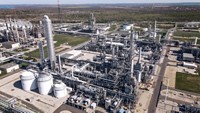Advertisement
Grab your lab coat. Let's get started
Welcome!
Welcome!
Create an account below to get 6 C&EN articles per month, receive newsletters and more - all free.
It seems this is your first time logging in online. Please enter the following information to continue.
As an ACS member you automatically get access to this site. All we need is few more details to create your reading experience.
Not you? Sign in with a different account.
Not you? Sign in with a different account.
ERROR 1
ERROR 1
ERROR 2
ERROR 2
ERROR 2
ERROR 2
ERROR 2
Password and Confirm password must match.
If you have an ACS member number, please enter it here so we can link this account to your membership. (optional)
ERROR 2
ACS values your privacy. By submitting your information, you are gaining access to C&EN and subscribing to our weekly newsletter. We use the information you provide to make your reading experience better, and we will never sell your data to third party members.
Energy
German chemical makers fear Russian gas supply cuts
Plants will close, executives warn, if Russia requires payment for natural gas in rubles
by Alex Scott
March 31, 2022

Germany’s main chemical industry association, VCI, is warning that chemical plants in the country will likely close, possibly for months, if Russia requires payment for natural gas in rubles. The effect on downstream industries would be severe, VCI says.
VCI’s comments are in response to a Russian law, set to take effect April 1, that requires payment for gas deliveries to be made in rubles. Sanctions imposed on Russia prevent German companies from conducting business in rubles.
It is unclear exactly how much Russian gas this regulation will affect. According to a press release issued by the German government, Russia has also said that “contractual partners” can continue to pay for gas in euros as usual to Gazprombank, which is not affected by sanctions. Gazprom is a Russian state-owned oil and gas company.
Gas supplies are currently considered to be adequate. Still, Germany’s economy minister, Robert Habeck, released a statement on March 30 saying that if supply restrictions are required the German government will prioritize households and hospitals over industry.
BASF, which operates one of the world’s largest chemical plants in Ludwigshafen, Germany, says a drop in natural gas supply to below half the level it requires would result in a “complete cessation” of production at its facilities.
Also on March 30, the European Commission’s antitrust regulator raided the German offices of Gazprom. The regulator is investigating whether Gazprom is withholding natural gas to influence prices. The Russian government has repeatedly denied holding back gas supplies.
Since the beginning of Russia’s invasion of Ukraine, natural gas prices in Germany have risen by an average of more than 70%, according to VCI. Germany’s pharmaceutical and chemical industry uses 2.8 million metric tons of gas annually, more than a quarter of the country’s total consumption.
Even before the invasion of Ukraine, natural gas prices in Europe had been surging upward. In September, high prices forced BASF to curtail its production of ammonia in Ludwigshafen and Antwerp, Belgium. Manufacturers of nitrogen-based fertilizers, such as CF Industries, continue to operate at a reduced rate in Europe.



Join the conversation
Contact the reporter
Submit a Letter to the Editor for publication
Engage with us on Twitter